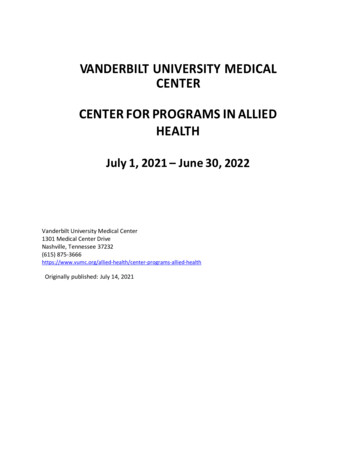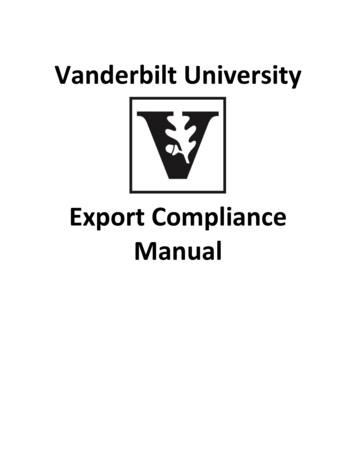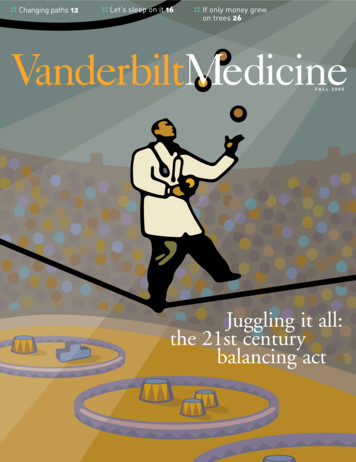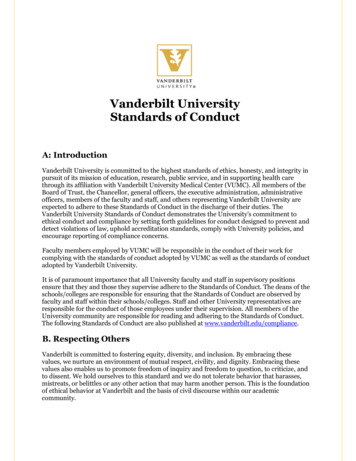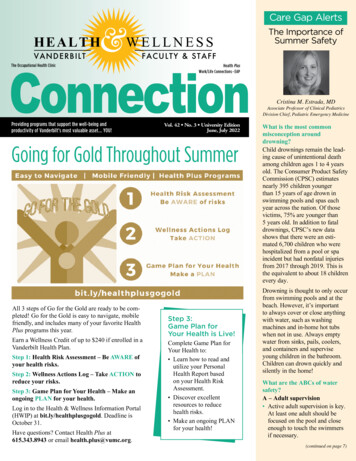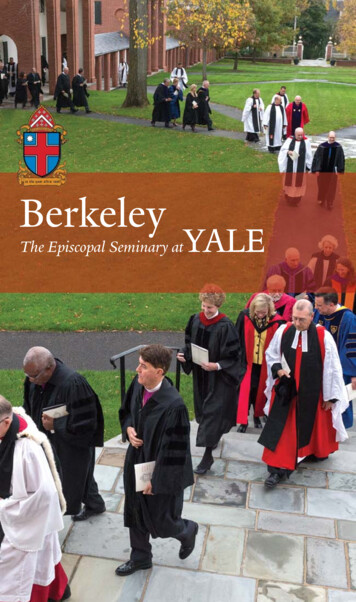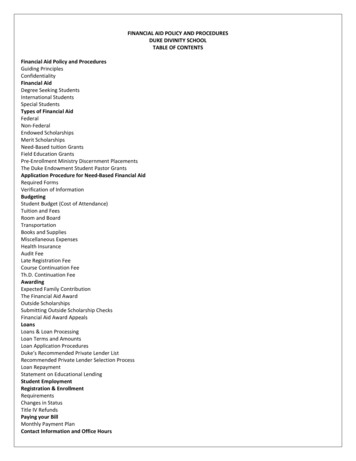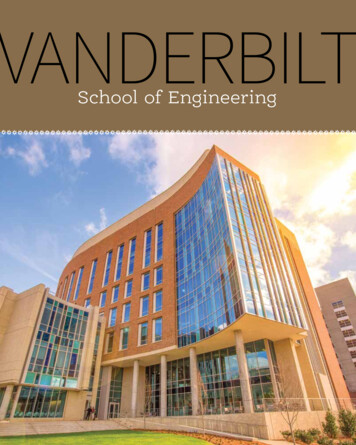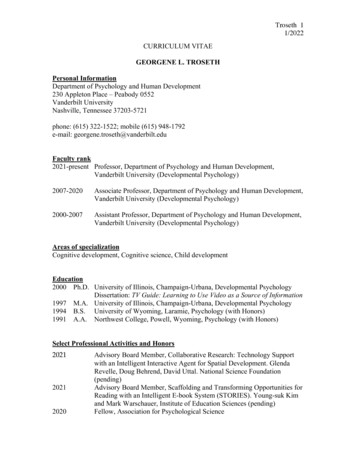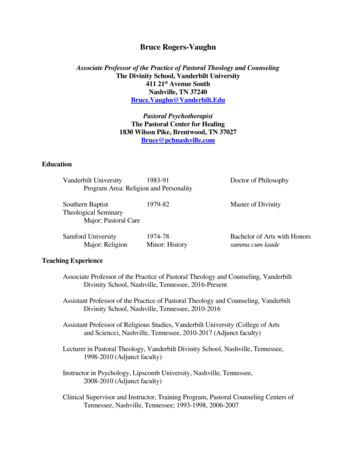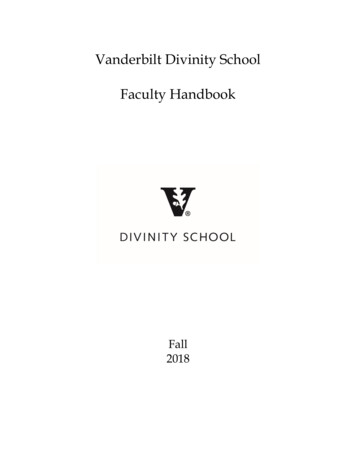
Transcription
Vanderbilt Divinity SchoolFaculty HandbookFall2018
PREFACEThe Faculty Manual (https://www.vanderbilt.edu/faculty-manual/) ofVanderbilt University is a guide to University policies and procedures for allVanderbilt University faculty. The Vanderbilt Divinity School Faculty Handbooksupplements the University Faculty Manual by providing additional detailsregarding the procedures and criteria used by VDS. In cases where there arepolicies or procedures described in this Handbook and the Manual that conflict,the Faculty Manual supersedes. The contents of this Handbook are made anexpress part of the contract of employment between each faculty member andthe School.VDS seeks feedback on the impact of policies and procedures on faculty.Concerns about policies that impact the professional life of faculty should bebrought to the attention of the chair of the Faculty Committee on Personnel andPolicy Committee (P&P) who will process the concern or recommendationthrough the committee. P&P may send its recommendations to the InstitutionalPlanning Committee (IPC) which has responsibility for revising the Handbook.IPC reserves the right to modify, eliminate, or add to the contents of thisHandbook from year to year. After a vetting by all relevant parties, IPC will sendthe revisions to the full faculty for ratification. The Dean then submits changes tothe Handbook to the Provost or the Provost’s designee who will review thedocument and inform the schools of any problems prior to the beginning of thenext academic year. Appendices may not require full faculty approval.The Handbook is published on the Vanderbilt Divinity School website.
TABLE OF CONTENTSPageCHAPTER I -- THE ADMINISTRATION AND GOVERNANCE OF THEDIVINITY SCHOOL1.1.Administration11.2.Academic Program Directors11.3.Also Appointed by the Dean11.4.Committees of the Divinity School21.4.1. Faculty Committee on Personnel and Policy21.4.2. Academic Programs and Assessment Committee31.4.3. Institutional Planning Committee31.4.4. Admissions Committee41.4.5. Honor Council41.4.6. Worship Committee41.5.Faculty Participation in University Governance51.6.The Context of Faculty Work in a University5CHAPTER II -- FACULTY POLICIES2.1. The Faculty72.1.1. Faculty Membership in the Divinity School72.1.2. Faculty Membership in the Graduate Department of Religion72.2. Academic Titles and Terms of Appointment in the Divinity School2.2.1. Lecturer and Senior Lecturer99
2.2.2. Instructor and Assistant Professor92.2.3. Associate Professor and Professor102.2.4. University, Distinguished, and Named Professor orAssociate Professor2.2.5. Visiting2.3 Faculty Categories in the Divinity School1010102.3.1. Adjuncts102.3.2. Long-term Adjuncts102.3.3. Teaching Staff112.3.4. Non-Tenure Track, Practice Faculty112.3.5. Non-Tenure Track, Research Faculty112.3.6. Tenure-Track and Tenured Faculty112.3.7. Emerita or Emeritus Faculty122.3.8. Secondary and Affiliate Faculty122.3.9. Dual Faculty122.4. Guidelines for Appointments and Renewals for Part-time Faculty132.4.1. Adjunct Faculty132.4.2. Long-term Adjunct Faculty and Teaching Staff132.5. Guidelines for Appointments, Renewals, and Promotions for Fulltime Faculty132.5.1. Ex parte private communications142.5.2. Policies and Procedures for Initial Appointments142.5.2.1. Authorization of Academic Positions152.5.2.2. Search Committee Composition and Procedures forInitial Full-time Appointments15
2.5.2.3. Standards and Procedures for the Award of Tenurefrom Outside the University172.6. Policies and Procedures for Reviews and Promotions for Full-timePractice Faculty182.6.1. Expedited reviews192.6.2. Review and Promotion Committees192.6.3. Timeline for Reviews192.6.3.1. Eligibility for Promotion to Associate Professor202.6.3.2. Eligibility for Promotion to Professor202.6.4. Dossiers202.6.5. Criteria212.6.5.1. Criteria for Reappointment Review212.6.5.2. Criteria for Promotion to Associate Professor of thePractice2.6.5.3. Criteria for Promotion to Professor of the Practice2.6.6. Process for Reappointments and Promotions2122222.7. Policies and Procedures for Reviews and Promotions for Non-tenureTrack Research Faculty232.7.1. Expedited reviews242.7.2. Review and Promotion Committees242.7.3. Dossiers242.7.4. Timeline for Reviews252.7.5. Criteria and Process262.7.5.1. Criteria for Promotion to Associate Professor262.7.5.2. Criteria for Promotion to Full Professor26
2.8. Policies and Procedures for Reviews and Promotions for TenureTrack Faculty at Instructor Level262.8.1. Review and Promotion Committees262.8.2. Timeline262.8.3. Dossiers272.8.4. Criteria for Review and Promotion272.8.5. Process272.9. Policies and Procedures for Reviews of Tenure Track Faculty atAssistant Level282.9.1. Review Committee282.9.2. Timeline282.9.3. Dossiers292.9.3.1. First Review/Second Year Dossier292.9.3.2. Second Review/Fourth Year Dossier292.9.4. Criteria for Review302.9.5. Process for First and Second Reviews302.10. Policies and Procedures for Promotion to Associate Professor andthe Award of Tenure312.10.1. Review and Promotion Committees312.10.2. Timeline322.10.3. Dossiers332.10.3.1. Letters332.10.3.2. Curriculum vitae332.10.3.3. Publications and On-going Research342.10.3.4. Group Teaching or Research34
2.10.3.5. Course Evaluations342.10.3.6. Candidate’s Statements342.10.3.7. Review Committee’s Recommendation342.10.3.8. Minutes of the Faculty352.10.3.9. Evidence of special arrangements352.10.3.10. Other Materials352.10.4. Criteria for Review and Promotion352.10.4.1. Scholarship and Research362.10.4.2. Teaching and Professional Education372.10.4.3. Service382.10.5. Process2.11. Policies and Procedures for Promotions for Tenured Faculty38392.11.1. Review and Promotion Committees392.11.2. Timeline402.11.3. Dossier402.11.4. Criteria for Promotion402.11.5. Process402.12. Appeals412.13. Distinguished Professorships and Named Professorships422.14. Administrative Officers422.15. Emeritus and Emerita Faculty42CHAPTER III -- FACULTY BENEFITS3.1. Leaves of Absence443.2. Professional Travel and Research Funding46
3.3. Offices, Equipment, Supplies463.4. Support Staff Services473.5. Duplication of Materials483.6. House Hunting and Relocation Expenses483.7. Research Assistants, Teaching Associates, and Work-Study Students483.8. Discounts50CHAPTER IV -- RESPONSIBILITIES4.1. Annual Conflict of Interest Report514.2. Annual Conversation with the Dean514.3. Academic Load524.4. Course Offerings524.4.1. New Courses Approval Process534.5. Syllabus Requirements534.6. Textbook Lists544.7. Advisory System544.8. Summer Responsibilities554.9. Attendance at Meetings and Events554.9.1. Faculty Meetings564.10. Absence from Classes564.11. Non University Duties of Faculty Members564.12. Reading of Master of Divinity Projects57CHAPTER V -- OTHER INFORMATION5.1. Grading58
5.2. Academic Credit585.3. Class Schedule585.4. Office Hours585.5. Documents Reflecting the School's Commitments585.6. Confidentiality of Student Records595.7. Facsimile Services605.8. Library Support605.9. Faculty Lounge605.10. University Travel605.11. Divinity School Calendar615.12. Scheduling Use of Rooms615.13. Communication61APPENDICESAppendix ALiving the Commitments63Appendix BToward a More Inclusive Language69Appendix CNew Faculty Checklist71Appendix DConstitution of the VDS Honor Council74Appendix EDivinity School Computer/IT Policy84Appendix FProcedures for Conducting a Search85Appendix GGrant Proposal Guidelines and Procedures92
CHAPTER ITHE ADMINISTRATION AND GOVERNANCE OF THEDIVINITY SCHOOL1.1. Administration1. Dean2. Associate Dean for Academic Affairs3. Associate Dean for Graduate Education and Research4. Assistant Dean for Development and Alumni Relations5. Assistant Dean for Academic Affairs6. Assistant Dean for Admissions, Vocation, and Stewardship7. Assistant Dean for Student Life8. Director of Communications9. Director of the Divinity Library10. Chief Business Officer1.2. Academic Program Directors1. Director of Cal Turner Program for Moral Leadership in the Professions(CTP)2. Director of Carpenter Program in Religion, Gender and Sexuality3. Director of Field Education4. Director of Global Education5. Director of the Kelly Miller Smith Institute on Black Church Studies(KMSI)6. Director of Religion in the Arts and Contemporary Culture (RACC)7. Director of the Riverbend Program8. Director of the Theology and Practice Program (T&P)1.3. Also Appointed by the Dean1. Chair of the Graduate Department of Religion1
1.4. Committees of the Divinity SchoolThe Dean carries responsibility for the assignment of faculty members tomost committees and for designating the persons to serve as chairs. Studentmembers, when needed, are traditionally assigned by the other members of thecommittee.1.4.1. Faculty Committee on Personnel and PolicyThe Faculty Committee on Personnel and Policy is the only electedcommittee in the School. There are five voting members of the committeeelected for two-year terms by the faculty. Persons elected must be fulltime faculty whose primary appointment is in the Divinity School and whowill not be on leave any time during the first year of their term. Three ofthe five members, including the chair, must be tenured. Non-tenure trackmembers of the committee do not participate in the deliberations or voteon matters related to reviews of tenured or tenure-track faculty. The chairof the committee is elected by the faculty to a one-year term with thepossibility of a second term. Members of this committee may not be reelected to continuous terms. If a voting member’s term is interrupted byan appointment to an ex officio role, the faculty member finishes the votingterm at the conclusion of the ex officio appointment. Individuals serving onor elected to the Faculty Senate are exempt from serving on P&P whileserving as a senator. The Dean, associate dean for academic affairs, andchair of the Graduate Department of Religion participate in deliberationsof the committee as ex officio members with voice but without vote. Theassistant to the deans serves as recording secretary.Responsibilities of the chair: Serve as chair of the faculty, consulting with the Dean andrepresenting the faculty during the year. Consult with the Dean prior to the formation of searchcommittees and faculty review committees since at least onerepresentative from P&P serves on each review and searchcommittee. This representative reports to P&P on the progressof the committee.Responsibilities of the committee: Approve job descriptions developed by the search committeesin consultation with the Dean. Make recommendations to the faculty regarding facultypositions. Make recommendations to the Dean regarding faculty leaves.2
Represent the faculty on matters of policy. Advise the Dean on other matters as requested or at its owninitiative. Assess colleagues’ readiness for promotion from tenuredassociate professor to tenured full professor. Makerecommendation to the faculty member.1.4.2. Academic Programs and Assessment CommitteeThe Academic Programs and Assessment Committee consists of theassociate dean for academic affairs, assistant dean for academic affairs,director of global education, and at least four faculty members (to includeat least two tenured faculty), professional divinity librarian, and a memberof the field education faculty. The assistant to the deans serves asrecording secretary.APAC is concerned with the overall pedagogical strength of theDivinity School and makes recommendations to the faculty to this end.Curricular development is the purview of the faculty as whole;however, the Academic Programs and Assessment Committee hasoversight over the curriculum. This committee discusses the componentsof the syllabus of all new courses and the relation of the new course to theadvancement of the School’s mission statement and how to designate thecourse within the curricular foundational requirements and corerequirements of the degree programs.APAC annually reviews assessment data and forwards informationand proposals for curricular improvement to the faculty.1.4.3. Institutional Planning CommitteeThe Institutional Planning Committee consists of the Dean; theassociate dean for academic affairs; chair of the faculty; chair of theGraduate Department of Religion; associate dean for graduate education ;assistant dean for academic affairs; assistant dean for admissions, vocation,and stewardship; chief business officer; assistant dean for student life;director of communications; and director of the library. The assistant to thedeans serves as recording secretary.The Institutional Planning Committee is responsible for setting upand maintaining the assessment of the institutional practices of the School,excluding curricular assessment which falls under the Academic Programsand Assessment Committee. It also engages in strategic planning,evaluating, and making recommendations for the overall physical and3
fiscal health of the School.The Institutional Planning Committee attends to the School’scontinuing vitality by reviewing relevant data to assess performance andevaluates the School’s overall progress toward fulfilling its mission andmeeting its desired goals.The committee reviews all grants of 25k or more proposed by thefaculty and staff before submission to make sure there are no duplicationof efforts, attention has been paid to sustainability, that the School has theinfra-structure and resources to accomplish the grant’s goals, and there iscoherence with the Statement of Commitments and the Purpose Statement.IPC is responsible for the Faculty Handbook.In addition, the committee reviews the work and budgets of theschool’s co-curricular and worship programs on an annual basis.1.4.4. Admissions CommitteeThe Admissions Committee consists of the assistant dean foradmissions, vocation, and stewardship; Dean; associate dean for academicaffairs; assistant dean for student life; and two faculty members.The Admissions Committee reviews applications for admissions tothe Divinity School’s degree programs and decides admissions offers tothe entering class for the next academic year. It also acts as a consultativebody for the assistant dean for admissions, vocation, and stewardship.1.4.5. Honor CouncilThe Honor Council consists of five faculty members and 10 studentmembers.The Honor Council seeks to preserve the integrity of the HonorCode of the Divinity School and Vanderbilt University. It seeks to securejustice for any student under suspicion of dishonesty, to vindicate thestudent’s name if innocent and if guilty, to protect the honor and standingof the remaining students by imposing a punishment as set forth in theConstitution of the Vanderbilt Divinity School Honor Council (AppendixD).1.4.6. Worship CommitteeThe Worship Committee consists of the assistant dean for studentlife, the director of RACC, the associate director of RACC, and at least twostudent interns.The Worship Committee provides a place for regular, ongoing4
dialogue about the worship program and its goals. This committeeconsults on the roster of liturgical leadership, provides feedback andreflection for worship interns, reflects on the strengths and areas forgrowth in the worship program, and fosters discussions about theintegration of worship, academics, and other events of community life.Convocation, weekly worship services, and the celebration andthanksgiving service prior to Commencement are under the purview of theWorship Committee.1.5. Faculty Participation in University GovernanceFaculty members carry University governance responsibilities as well. Thefaculty elects two persons to serve on the Faculty Senate. The terms are threeyear terms. Faculty who will be on leave any time during the first year of theterm are not eligible. At least one of the faculty senators must be tenured ortenure-track.One senior faculty member serves on the Promotion and Tenure ReviewCommittee (PTRC) that reports to the Provost. Others serve on other committeesof the University both standing and ad hoc.The Dean serves on the Academic Affairs Leadership Committee and theCouncil of Academic Deans which meet with the Provost of the University.1.6. The Context of Faculty Work in a UniversityThe world of higher education has many traditional procedures andexpectations which have been codified as questions and disputes arise. Severalbasic factors shape the usages of higher education:From the beginnings of the university, it has been understood that facultiesare responsible for admission of students, programs of study, evaluation ofstudents, and granting of degrees. Faculties have also insisted on the rights ofpeer review, discipline, and appeal, with all the responsibilities accompanyingthose rights.At the same time the university as a legal corporation has increasinglybecome differentiated from the faculty, especially in the raising of funds, themaintenance of facilities, and the administration of programs of research andinstruction. Faculty members in one sense are employees of the university; inanother sense they are the university. All policies and procedures that affect thefaculty and the programs of study continue to be reviewed by the faculty or itsrepresentatives in bodies such as the Faculty Senate, and the terms of theiremployment are stated in documents such as the Faculty Manual.Because of the importance of education in society, the operations of the5
university are increasingly scrutinized by the public, regulated by law,adjudicated within the university through complaint and appeal procedures, andlitigated in the courts. While faculty members have access to the courts asindividuals or through organizations such as the American Association ofUniversity Professors, they are also aided and protected by the legal counsel oftheir universities, for in carrying out their activities they are acting as agents ofthe university – but only when they are acting within the authority thataccompanies their capacity as faculty members or administrators of programs.6
CHAPTER IIFACULTY POLICIES2.1. The Faculty2.1.1. Faculty Membership in the Divinity SchoolThe faculty of the Divinity School includes all faculty members regularlyoffering instruction in the programs leading to degrees conferred by theDivinity School. Voting members of the faculty include all those who holdthe rank of senior lecturer, assistant professor, associate professor, andprofessor and whose primary assignment is in the Divinity School and is fulltime. Administrative staff may be given voting privileges uponrecommendation of the Dean and approval by the faculty. Written absenteeballots will be accepted in all faculty meetings. Secret ballots are allowableonly during hiring decisions or reappointment or promotion reviews.2.1.2. Faculty Membership in the Graduate Department ofReligionThe faculty of the Graduate Department of Religion includes all facultymembers regularly offering instruction in the programs leading to the M.A.and the Ph.D. degrees. The department meets regularly to conduct itsbusiness. It selects representatives to serve on committees or otherdeliberative bodies of the Graduate School.Vanderbilt faculty members with primary appointments in theReligious Studies department or the Divinity School are potentially eligible tobecome full members of the Graduate Department of Religion upon approvalof the GDR faculty. In addition, designated faculty members of other schoolsor departments of the University who pursue scholarly interests in any of theGDR programs of study may be nominated by GDR areas to become associatemembers of the Graduate Department of Religion with voice but no vote onthe GDR faculty, including all areas of policy and admissions decisions. Thefaculty of the Graduate Department of Religion must approve all candidatesfor membership, including assignment to an area of specialization. Afterfaculty approval, the chair of the GDR shall provide to the Dean of theDivinity School a letter addressing a candidate’s potential contribution to thegraduate program and recommending appointment to the GraduateDepartment of Religion.From time to time, the Jewish Studies faculty may select a faculty7
member who is not a member of GDR to serve as the director of the JewishStudies area in the GDR. While that person serves as area director, they willbe a voting member of the Graduate Policy and Admissions Committee(GPAC). The position does not confer de facto membership or voting rights inthe GDR.Faculty members associated with the Graduate Department of Religionhave additional responsibilities as members of the graduate faculty. It is to benoted that the dean of the graduate school appoints faculty members to allqualifying committees and dissertation committees. Attendance at meetingsto discuss examinations, approve dissertation proposals, and conductdissertation defenses is expected. The GDR administrative assistant makesevery effort to find meeting times that are satisfactory to all committeemembers. Lack of cooperation could mean that degree candidates will beunable to be graduated. Special problems are created when faculty membersexclude whole days from consideration. While efforts are made by the GDRadministrative assistant to accommodate their work schedules, facultymembers should be available on any day of the week for committee meetings,including dissertation defenses.Collegiality in instruction and governance is a traditional expectation inthe world of higher education. Additional responsibilities are involved ingraduate study where faculty members have advisory, mentoring, and“apprentice” relationships with students, and where recommendations byfaculty members are crucial to their academic careers. It is essential thatstudents not be caught in the midst of faculty rivalries or be under the controlof a single faculty member in the old-world tradition of the Doktorvater.Students are admitted to the department and to a specific area, not to tutelageunder a particular faculty member, and financial aid is given by thedepartment as a whole. It is important that all faculty members in theprogram be involved in advising and course work and be included onexamination and dissertation committees. When grants are administered by asingle faculty member, there still are responsibilities to the University and tothe department or school. One of the widespread customs in programs thatare “grant driven” is to share the benefits with other faculty members andtheir students, knowing that funding may vary from year to year.8
2.2. Academic Titles and Terms of Appointment in theDivinity School2.2.1. Lecturer and Senior LecturerThe titles Senior Lecturer and Lecturer designate teachingappointments that are not within the normal promotion sequence fromInstructor to Professor. Lecturers may be part time or full time and areappointed for terms of no more than one year. Senior Lecturers may holdpart-time or full-time teaching positions and may be appointed for termsof no more than three years.2.2.2. Instructor and Assistant ProfessorThe titles Assistant Professor and Instructor may be part time or fulltime, are term appointments, and do not imply tenure. For tenure-trackfaculty, full-time service in these two ranks is counted in the probationaryperiod leading to mandatory action by the University either promoting theindividuals to tenure rank or notifying them that they will not bepromoted. The maximum number of years of probationary service in thetenure-track is seven; followed by an eighth terminal year if an adversedecision on tenure is reached in the seventh year. The limit may beextended under certain conditions as specified in the University’s FacultyManual (II, 3, B-4).Assistant professors may be appointed for a term of not more thanthree years at a time. Instructors are appointed from year-to-year.Candidates who hold the Ph.D. degree or equivalent are usually appointedto the rank of assistant professor; those who are in process of completingthe doctoral degree normally are appointed to the rank of instructor.Appointment to the rank of assistant professor on the tenure trackshall be for an initial term of three years (August 16, X – August 15, X 3),with the possibility of additional appointments of two (August 16, X 3 –August 15, X 5) and then three years (August 16, X 5 – August 15, X 8) ifthe record supports such additional appointments. Persons initiallyappointed to this rank who have served elsewhere at the rank of instructoror assistant professor shall be appointed for terms of service that takeaccount of their prior service but only to the extent that the previousservice offered opportunities for professional growth and achievementcomparable to those enjoyed by tenure-track appointees at Vanderbilt Atthe time of appointment to a tenure-track position at Vanderbilt, thecandidate and the Dean must agree on the number of prior years to count9
toward tenure.2.2.3. Associate Professor and ProfessorProfessors and Associate Professors hold academic tenure if sospecified at the time of appointment to that rank. Non-tenured or nontenure-track faculty at this rank are appointed to terms of not more thanfive years. Appointments are renewable depending upon successfulreview. Faculty at this rank may be part time or full time.2.2.4. University, Distinguished, and Named Professor orAssociate ProfessorThe titles University Distinguished Professor, DistinguishedProfessor, University Professor, and Named Professor or Named AssociateProfessor signify tenured positions at Vanderbilt. Except for UniversityDistinguished Professor and University Professor, these faculty titles carrya major field or area designator. In the early 2000s, seven-year, renewableterm limits were imposed on faculty holding these titles.2.2.5. VisitingThe prefix “Visiting” designates faculty members who normally arebased at other institutions of higher education and who temporarilytransfer their main base to Vanderbilt. The titles are applicable for full-timeor part-time service at Vanderbilt.2.3 Faculty Categories in the Divinity SchoolFaculty in these categories may hold any of the titles described above.2.3.1. AdjunctsAdjuncts are part-time faculty teaching a course or two on asemester-by-semester basis. They do not participate in faculty meetings orserve as student advisors. Neither are they assigned to committees of theSchool.2.3.2. Long-term AdjunctsLong-term adjuncts are part-time faculty teaching a course or twoyear after year. They do not participate in faculty meetings or serve asstudent advisors. Neither are they assigned to committees of the School.10
2.3.3. Teaching StaffTeaching staff are full-time staff who have teaching responsibilities.The faculty appointment does not carry any advising or committee serviceresponsibilities.2.3.4. Non-Tenure Track, Practice FacultyNon-tenure track practice faculty are full-time faculty who areappointed for their expertise in an area of the practice of ministry andappointed with the designation of the practice of ministry in their titles.Practice faculty are integral to the teaching mission and faculty leadershipof the institution. Strong practice faculty members are critical to advisory,supervisory, instructional, and administrative demands of the School'sprograms, particularly the Master of Divinity. Practice faculty will bevoting members of the bodies of which they are members (the DivinitySchool faculty, its committees, and committees of the University). Practicefaculty members may be voting members of review and promotioncommittees for practice faculty at or below their rank in the School. Theyare eligible for academic leave on the same basis as tenured and tenuretrack faculty.2.3.5. Non-Tenure Track, Research FacultyNon-tenure track, research faculty are full-time ranked faculty whoare not on the tenure track yet are expected to pursue an active program ofresearch parallel to that of tenured and tenure-track faculty. These facultyusually serve concurrently as faculty in the Graduate Department ofReligion. They are eligible for academic leave on the same basis as tenuredand tenure-track faculty.2.3.6. Tenure-Track and Tenured FacultyTenure-track and tenured faculty are full-time faculty seeking orholding tenure. “Academic tenure” at Vanderbilt refers to the University’scommitment to continue any faculty member appointed as Professor orAssociate Professor in that office, unless otherwise specified at the time ofappointment, until the faculty member voluntarily terminates theappointment or until retirement or permanent disability, or dismissal forcause. These faculty serve concurrently as faculty in the GraduateDepartment of Religion.11
2.3.7. Emerita or Emeritus FacultyAn Emerita or emeritus faculty is a tenured faculty member whoserved the University with distinction over a period of years, whoremained in active status until retirement, and who was awarded the titleof emeritus or emerita by action of the Board of Trust. (See section 2.15 ofthis Handbook.) No public announcement of the award may be made untilafter the Board of Trust action. Public recognition of emeritus or emeritastatus is made at Commencement at the end of the academic year.2.3.8. Secondary and Affiliate FacultySecondary and affiliate faculty are Vanderbilt faculty members withprimary appointments outside the Divinity School but who have beenapproved by the Divinity School faculty as having mutual interest andscholarship. Their association with the Divinity School faculty may be aseither affiliate or secondary faculty. A secondary appointment, unlike anaffiliate faculty appointment, is a term appointment. Secondaryappointments require decanal approval from the primary appointmenthome. Faculty members with approved affiliate or secondaryappointments may be noted as such on the Divinity School website andother public media, and may themselves note this on their faculty webpages, curricula vitae, etc. Affiliate f
The Handbook is published on the Vanderbilt Divinity School website. TABLE OF CONTENTS Page CHAPTER I -- THE ADMINISTRATION AND GOVERNANCE OF THE DIVINITY SCHOOL 1.1. Administration 1 1.2. Academic Program Directors 1 1.3. Also Appointed by the Dean 1 1.4. Committees of the Divinity School 2 1.4.1. .
